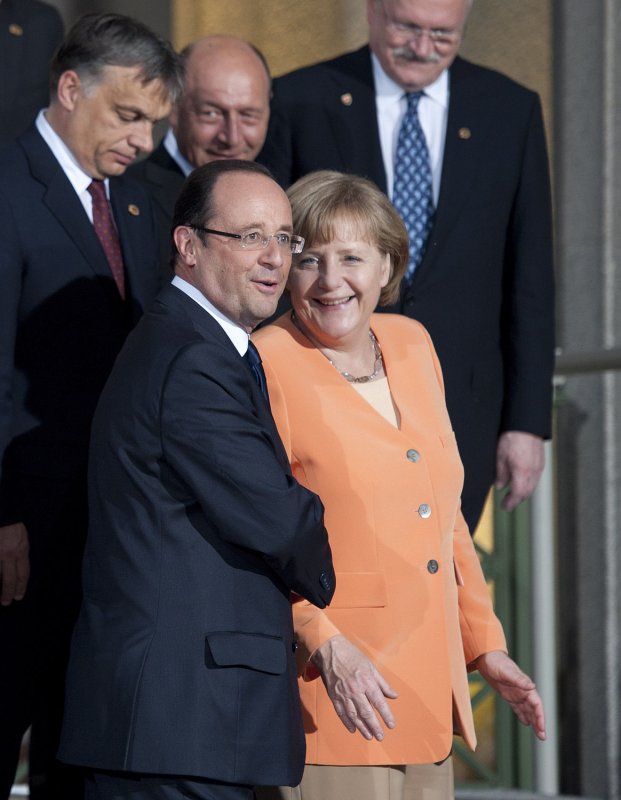French President Francois Hollande (L) bumps into German Chancellor Angela Merkel as NATO heads of state walk off the stage following a group photo before a dinner at Soldier Field during the 2012 NATO Summit on May 20, 2012 in Chicago. UPI/Brian Kersey |
License Photo
PARIS, Aug. 20 (UPI) -- Just back from vacation, France's President Francois Hollande plunges right back into a new euro crisis, as he goes to Berlin for talks this week with Chancellor Angela Merkel. And then each of them separately has talks with the new Greek Prime Minister Antonis Samaras, who is hoping to be allowed four years rather than two to carry out the deficit cuts and privatizations required by his European partners.
The chances are not good.
"We cannot responsibly throw money into a bottomless pit," German Finance Minister Wolfgang Schauble said at the weekend.
Volker Kauder, leader of the ruling conservative coalition in the Bundestag, Germany's parliament, was dismissive of Greek hopes. "There is no more latitude, either on the timeframe or the matter itself," he said.
So over the last three weeks, when so many of Europe's leaders and policymakers have been on vacation or focused on the Olympic Games (or both), the euro crisis hasn't gone into hibernation.
In fact, it got worse, with another member heading for trouble. At least it's a little one, Slovenia, with less than 1 percent of Europe's economy. But the interest rate it has to pay for finance its deficit jumped to more than 7 percent, the danger level at which Greece, Ireland and Portugal had to apply for a formal European bailout.
Formerly the most economically advanced province of Yugoslavia (partly because it was the closest to Austria), Slovenia was the first of the EU member states from Central and Eastern Europe to join the euro. At the time, its economy looked in good shape, but the government and the public sent on a spending and borrowing spree and the bills are due.
The crisis worsened in another way at the weekend when Der Spiegel, Germany's top weekly, reported that the Greek government had underestimated the tax ahead. They need to find an extra $17.3 billion from taxes and privatization over the next two years, not the $14.2 billion that Athens had calculated.
It may not sound like much but German public opinion is in no mood to pay a penny more and the Dutch and Finns are out of patience with the Greeks. Moreover, the Dutch are facing a general election Sept. 12, which appears to shaping up to be something of a referendum on the euro and the price of European solidarity. The main parties are under pressure to issue pledges of no new bailouts and no new powers being transferred to Europe without a referendum.
Since the Dutch were among the countries that voted "No" in the referendum on the Lisbon Treaty, they aren't eager to continue forking out their hard-earned cash in return for Greek promises. (Not that their "No" vote mattered; the Dutch joined anyway once governments agreed to define as just a treaty rather than as a European Constitution.)
And Finnish officials last week confirmed publicly that they are working on contingency plans for a breakup of the euro. So is everybody else (it would be a dereliction of governmental duty if they weren't) but nobody else wants to admit it openly.
In Greece the mood is turning ugly, with street killings and attacks on immigrants taking place on a daily basis, Athens Mayor Giorgos Kaminis says. Young Greek extremists on motorbikes are responsible, a spokeswoman for the U.N. High Commissioner for Refugees in Athens told reporters.
Those responsible, she added, "work almost undisturbed" as police have so far not been able failed to convict anyone , and migrants are really scared to report and press charges because they may be arrested if they do."
The Greek government is engaged in a crackdown on illegal immigration, in a campaign named Xenius Zeus, in a rather odd reference to the Greek god of hospitality. So far some 8,000 people have been arrested and close to 2,000 are in administrative detention pending deportation.
But while most observers continue to focus on the prospect of a "Grexit," the fashionable shorthand for a Greek departure from the euro, some well-informed players think a British departure from the European Union may be the real option to watch. Tony Blair, Britain's former prime minister, has expressed his own "deep alarm" to friends, and a leaked strategy paper from Japanese bank Nomura is preparing contingency plans for a British exit which it claims is "increasingly likely."
This is based on the growing likelihood that any further support measures for the weaker countries, including Spain and Italy, will require changes in the EU Treaties to strengthen the power of EU institutions in economic policy-making and enforcement. If those treaty changes, which are expected to be foreshadowed in the verdict of Germany's constitutional court which is due Sept. 12, are brought into effect, then Britain will have a referendum and few expect a clear "Yes" vote.
Meanwhile at Frankfurt airport, a symbolic event took place in Terminal 2 last week when a 16-foot high sculpture of the euro was removed as unsafe to passengers. For the moment, the similar sculpture outside the European Central Bank headquarters in the city remains.















